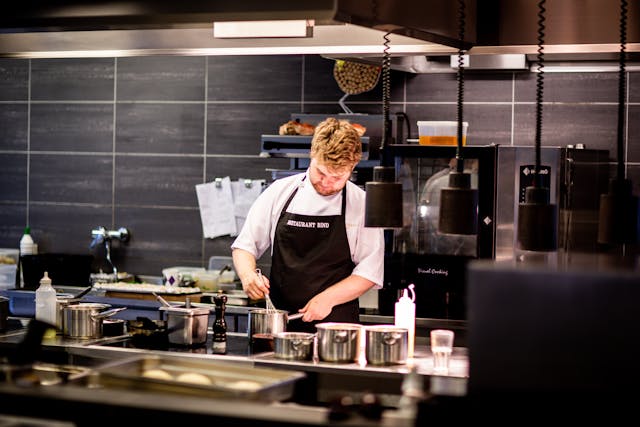Find More Kitchens for Rent in MN
Commercial Kitchen for Rent in Minneapolis
Showing 5 verified kitchens

Dots Gray Kitchen
Commercial kitchen space available for rent.

CityFoodStudio
Commercial kitchen space available for rent.
LOL Kitchen
Commercial kitchen space available for rent.
SHARED USE COMMERCIAL KITCHEN
Commercial kitchen space available for rent.
Kitchen Space
Commercial kitchen space available for rent.
Showing 5 results
Ads
Minneapolis's Growing Food Scene
Minneapolis boasts a vibrant and evolving culinary landscape that reflects both local traditions and innovative dining trends. The city's food scene combines established favorites with emerging concepts, creating opportunities for entrepreneurs to both honor local preferences and introduce new ideas. From food trucks to fine dining establishments, Minneapolis offers diverse dining experiences that demonstrate consumer openness to culinary innovation. Local food festivals, farmers markets, and culinary events showcase the community's appreciation for quality ingredients and creative preparation. The city's food critics and social media influencers actively champion new restaurants and concepts, providing valuable marketing opportunities for new businesses. Established food culture creates a knowledgeable customer base that appreciates quality while remaining open to new flavors and concepts. The growing food scene attracts food tourists and creates buzz that benefits all local food businesses through increased visibility and foot traffic.
Minneapolis's diverse population creates exceptional opportunities for food entrepreneurs serving multicultural communities and busy families. This demographic diversity reflects modern America's changing food preferences, with residents increasingly seeking authentic cuisines and convenient meal solutions. Research shows that 60% of Minneapolis consumers order takeout or delivery at least once a week, driven by busy lifestyles and dual-income households. The city's residential patterns create distinct neighborhoods where food delivery thrives, especially during evening hours when families need convenient dinner solutions. Young professionals and established families both value high-quality, convenient meal options that save time while providing variety and authentic flavors. Home ownership rates indicate stable communities with established dining habits and disposable income for food services. The growing preference for delivery over dining out, particularly among suburban families, creates consistent demand for ghost kitchen and meal delivery concepts.
Minneapolis's dynamic workforce drives significant demand for convenient, high-quality meal options during busy workdays and corporate meetings. The concentration of professional services, healthcare, and business operations creates a large population of time-conscious workers who value meal delivery services. Average commute times and office-based work schedules create predictable lunch and dinner rush periods that food businesses can optimize around. The rise of remote and hybrid work arrangements has expanded delivery opportunities to residential areas during traditional business hours. Corporate culture increasingly includes food benefits and catered meetings, providing opportunities for bulk catering and corporate accounts. Business lunch meetings remain important for relationship building, creating demand for professional-quality group meal orders and presentation-ready packaging. Higher-income professionals represent a premium market segment willing to pay for convenience, quality ingredients, and unique culinary experiences.
Minneapolis's educated population and student community drive innovation in food trends and represent early adopters of new delivery platforms and concepts. College students and recent graduates combine adventurous food preferences with strong digital engagement habits and regular delivery app usage. University of Minnesota creates a constant influx of young adults who view food delivery as an essential part of their lifestyle rather than a luxury service. Students and young professionals often work irregular hours, creating demand for late-night delivery options and weekend meal services. This educated demographic actively seeks out diverse cuisines, sustainable food options, and restaurants that align with their values and social media presence. Graduate students, medical residents, and young professionals have limited cooking time but sufficient income to prioritize convenient, nutritious meal options. The concentration of educated consumers makes Minneapolis an ideal testing ground for innovative food concepts before expanding to other markets.
Minneapolis's income diversity creates opportunities for food businesses to serve multiple market segments through strategic pricing and menu offerings. The substantial middle-income population balances budget consciousness with willingness to pay for convenience during busy periods and special occasions. Higher-income households demonstrate different ordering behaviors, ordering delivery more frequently and spending more per order than average consumers. Income distribution patterns reveal distinct market segments that can be served with different brands, pricing strategies, or menu offerings from the same commercial kitchen. Professional services and established industries create seasonal income fluctuations that smart food entrepreneurs can capitalize on with targeted offerings. The city's cost of living relative to income means residents have discretionary spending power for dining and delivery services. Economic stability and employment growth in key industries support sustained demand for food services and premium dining experiences.
Why Start a Food Business in Minneapolis
Minneapolis presents excellent opportunities for food entrepreneurs due to its diverse population, stable economy, and strong demand for convenient dining options. Minnesota's business-friendly environment includes favorable tax policies, streamlined permitting processes, and supportive small business resources. The $2.7B Minnesota food service market continues expanding at 14% annually, driven by population growth and changing consumer preferences. Commercial kitchen rental costs in Minneapolis remain competitive compared to major metropolitan areas, allowing entrepreneurs to test concepts with manageable overhead. The city's established delivery infrastructure and tech-savvy population create ideal conditions for ghost kitchen and food delivery concepts. Access to diverse suppliers, skilled culinary professionals, and multicultural ingredients supports authentic cuisine development and menu innovation. Successful food concepts in Minneapolis can easily expand regionally or serve as testing grounds for national restaurant chains and food brands.
Market Statistics
Diverse Market
Access to varied demographics and food preferences
Growing Demand
Increasing appetite for delivery and convenience food
Business Support
Access to commercial kitchens and business resources